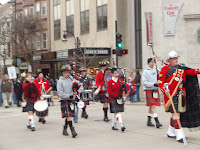Despite what some people think, not everyone owns a car. Especially in urban areas, parking can be quite costly, and no one should be forced to pay for it if they don't want it.
So below is the letter I wrote to city commissions when our neighborhood association wanted to force the developer guarantee a parking spot as part of the rent for all residents. They wanted to avoid more people parking on the streets in the neighborhood, but I thought their concerns were misplaced.
I know I may be in the minority among the people you hear from, but I will reiterate what I said at the meeting Monday night. Requiring all tenants to pay for a parking spot, whether they own a car or not, is both unfair, and bad for the neighborhood. If [the project] includes a parking spot with every apartment, you are forcing people to pay for something they don't need, don't want, and won't use. And it's not a community asset, like a green roof, patio, or work out room, that tenants may or may not use. A parking spot adds significantly to the cost of an apartment, so makes the apartment less affordable.
It also makes the apartment only attractive to those who own cars. Is that what [the neighborhood] wants? Is that good for the neighborhood? Do we want to only have drivers and car owners moving into an already crowded area? I don't think so.
To make sure I had my facts straight, I checked with [a representative of the developer.] They do not want to allow tenants to reassign the spot - the one they are required to pay for - to a friend, work colleague, or other party. Tenants would not be able to resell or rent the spot to someone else. [The building owners] considers that too much of a security risk.
So the expensive parking spot included with the apartment will not only be unused by the tenant, but will not be able to be used to get one more car off the neighborhood streets during the day. Again, is this in the interest of the neighborhood?
So, my request to you is: Do not ask that a parking spot be included with each apartment. It is bad public policy and bad for the neighborhood. If you are determined to require a parking spot be paid for by each tenant, then ask that [the building owners] allow the spots to be reassigned to outside parties. This will be more fair to tenants that do not own cars, and it will also get cars off our neighborhood streets.
As to commercial and visitor parking - i.e. short term parking - as a neighbor that lives one block from the site, I can tell you that there IS parking available on our neighborhood streets, although one might have to walk a block or two. Despite what some think, we live in an urban area, and one cannot expect to park directly in front of one's destination. The streets are a public area, and anyone can use them, including for parking. We have two hour limits during the day, and that's appropriate. I have no problem with commercial customers parking on my block, nor do I think that a lack of commercial or visitor parking will doom the project.
When we visit the Monroe, Atwood, or Williamson St areas, whether to visit friends, shop, or enjoy dinner or a drink, we often have to park on the street, and possibly several blocks away. (OK, Monroe has a parking garage at Trader Joes, but the east side areas do not.) That does not keep us from visiting these areas, nor does it seem to impede the success of businesses. Just as with our neighborhood, these areas were built for and continue to be accessible by foot, bike, and transit. People who live and visit these area expect that parking may be less convenient, but they also enjoy a wonderful neighborhood experience, highlighted by easy, pleasant walking.
Please don't let a few loud voices push you to make suggestions to the city committees that are in opposition to the interests of the neighborhood and the best practices of urban design. Several people have contacted me since the meeting to tell me they agree with me, so I am not alone. We all know that those opposed are often the loudest and most strident, but maybe not the majority.












